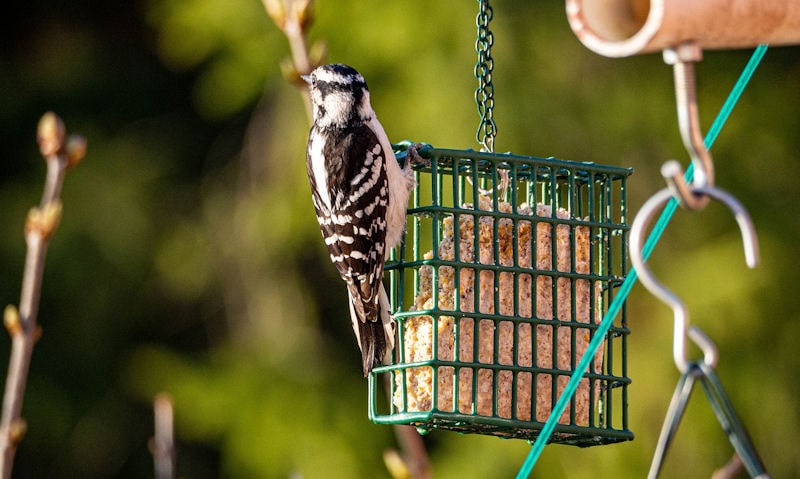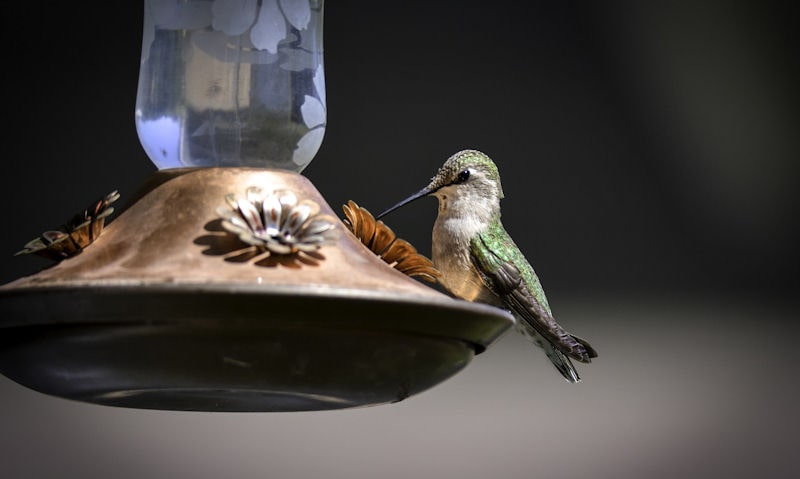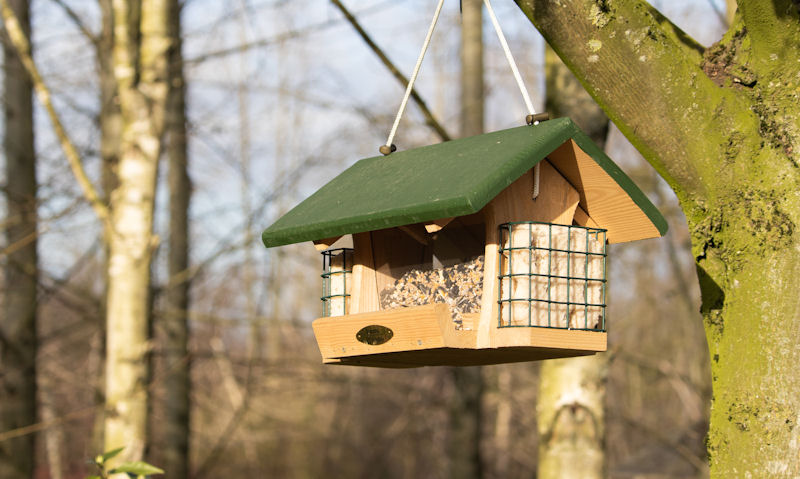Can bird feeders be in the sun
What can go wrong when bird feeders in the sun for a long spell is not an issue with feeders themselves, the bird feeder food will expire far sooner than it needs to.
Bird feeders can be in the sun if you only experience regular temperature in summertime. In hotter climates a shaded area would be your priority for all day. Sun hitting your feeder will warm up bird feed, which would cause it to germinate with bacteria - a shaded spot can prevent this happening so quickly.
Whilst some of us have the privilege of situating a bird feeder out of the sun at all times, many others cannot help it in an open environment within the yard.
Which case I will tell you to continue to situate bird feeders in the sun, while replacing bird feed as often as you can - before it spoils due to the heat of the sun causing it to rot within a day or two.
Bird feeders themselves can withstand whatever the weather throws at it; what is the issue is bird feeder food rapidly rotting away when intense heat causes it to germinate.
Germination of course will lead to bacteria growing on the surface, to which a bit of shade can prevent this happening so soon, and it will happy eventually.
First of all bird feeder food must be replaced every day or two days, to avoid rot setting in and spoiling the bird feeder interior.
Humidity will really be the killer on your bird feeders as bird feed sweats, the humidity will create an unsavory atmosphere, which would be perfect for bacteria to grow.
Bird feeders can be in the sun if you experience pleasant summer heat, though it never hurts to locate bird feeders in a shaded area for much of the day, or as much as you can achieve.
Feeders for peanuts, suet, mealworms and seed mixes need more shade than sun, whereas hummingbird feeders can be in the sun or shade - if you were to at least favor a cool, shaded area for much of the day.
Regular feeders can be in sun
While it doesn't feel very nice for us to be standing out in the sun all day, bird feeder food can just about handle the sun.
Regular bird feeders which is not the hummingbird or oriole kind, can withstand an extended period of heat, and thus the sun's UV won't damage it in such a short time.
Bird feeders made in plastic can fade though with it not taking a single summer to do it.
What is the issue with bird feeders hanging up in direct sunshine is of course the bird food. Bird feed you'll be pleased to know can be in the sun with any side-effects caused within a day or two.
Bird feeder food can begin to rot in a strong sun, thus it will begin to germinate with bacteria growing on the exterior of the feed... be it in peanuts, seed mixes or suet.
To counter the rapid germination of wild bird food within a bird feeder, its essential any bird feeder receives its fair share of shade.
Preferably late in the morning to mid afternoon, with bird feeders needing a cool spot to extend the life expectancy of the bird feed in use.
Regardless, bird feed germination will transpire in hot summer days whether you try to avoid it or not. Trick to that is to change out bird feed once or twice a week, or up to three times in case of super hot days.
Hummingbird feeders need shade
Bird feeders belonging to the kind that holds peanuts, seed mixes, suet or is an open tray, thus exposed to the elements can be in the shade with some sun expected.
What can't really be in the full strength of the sun for a long period of time is hummingbird feeders - the clear plastic window type that directs in the heat of the sun.
Hummingbird feeders contain what is a mixture of 1 part sugar to 4 part water, thus this concoction will quickly spoil in the sunshine. What will appear clear water at first will soon turn to a cloudy mist, in which this will tell you the nectar has gone off.
Feeders for hummingbirds, and so to orioles must have their fair share of shade to maintain quality nectar.
Hummingbirds enjoy feeding in direct sunshine with the possibility of feeding in shade, is really no big deal.
What you are after is to keep the sugary water at room temperature, which you can imagine is near impossible in the sun.
Shade can help you maintain a cool temperature with a cool breeze area in the yard, to which will keep that nectar temperature down.
In summertime nectar will get too hot regardless of what you do to prevent it, thus to change out the nectar every day, every over day and so forth can keep the nectar at its best.
Heat or humidity concern
While bird feeders can be in the sun with the option of placing feeders in any shade that may fall in your yard over the course of the day... what is really the problem is humidity.
Now sun can be hot and will certainly destroy regular bird feeder food within a day or two, and much sooner if its nectar for hummingbirds.
What can spoil food as it sits inside of any type of bird feeder is the humidity.
You know how hot it gets over the summer in a humid climate, with bird feeders this humidity can make bird feed sweat. Result of that is you'll see any bird food develop bacteria, with only a regular change of bird food to prevent it happening.
Sweating bird food is not good because then there's condensation, to which is the perfect breeding ground for bacteria to grow.
Whilst you've done your utmost best to prevent bird feeder food going bad as it hangs up in the yard - even a nice shady spot can't beat the humidity.
Once again then its up to you to replace bird feed as often as you possibly can, to be one step ahead of rotting, smelly bird food.
Sunny spot as normal
While some of you will experience the heat of the sun every day of the year in a sunny State or country, many of us will only have to worry about the sun in summertime.
To feed birds in a bird feeder in a regular summer with fair temperature in say NYC; then bird feeders can be put out as normal with no concern about if bird feeders can be in the sun.
Many of you won't have to worry about this as its business as normal with no care in the world - feeders can sit in the sun and the bird feed can last a while.
Summers can be quite hot to which I can say, you must always replace bird feeder food as often as you can. You'd need to throw away old bird food to replace with new is on the cards - while cleaning the bird feeder every time you do so.
And it never hurts to locate your bird feeders in a place that receives more shade than sun, and if this is too much hassle then simply set up feeders in the sun.
To always experience direct sunshine in hotter climates, then shade is imperative to be sure the bird food can last a day, before it rots. Locate bird feeders primarily under cover of a tree, a building or whatever it takes for a non-sunny spot in the yard.
Conclusion
Regular bird feeders are made in material that can last forever in sun if they have to, with noticeable fading or wear and tear possible, while still serving its purpose.
Bird feeder food is a different matter, and while wild bird feed is designed to be outdoors, inside a bird feeder or exposed to the elements - bird feed can rot under a tough sunny spot, over an extended time.
Bird feeders for peanuts, seed mixes and suet - including open top dishes or platform feeders - can be in the sun if the sun remains quite mild or is just hot.
What is the issue is if its sunny then it might by summertime or still a hotter climate, thus the sun is not going to be the problem as the humidity will kill off bird food quickly.
Bird feed can sweat in the humidity and therefore will begin to rot within a day or two.
Similarly, hummingbird feeders contain a sugary mixture that is going to spoil in direct sun as the sun's UV hits the clear plastic window full on - with the interior temperature turning the homemade nectar cloudy.
What you must do for any kind of bird feeder is prioritize a shaded patch for most of the day.
Now this won't stop bird feeder food going bad in hot weather or in humidity, though it can extend the life of bird food if at all possible for a day or two longer.
If you feel the sun is spoiling the bird food within the feeders, even with shade; solution to that is always replace bird feed with new as often as you can, then its problem solved.


